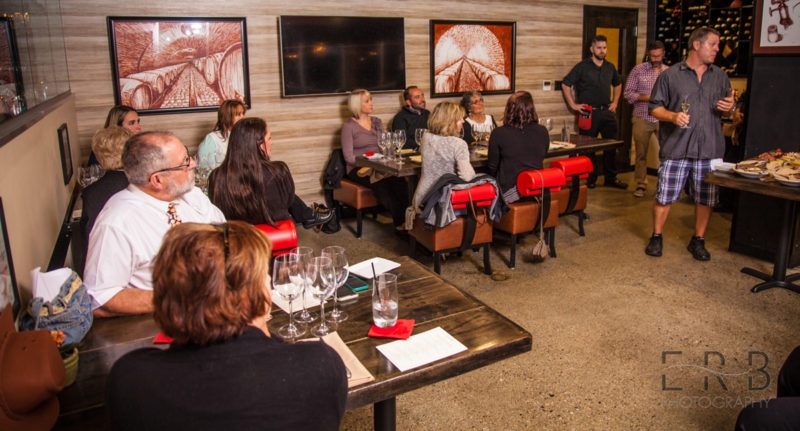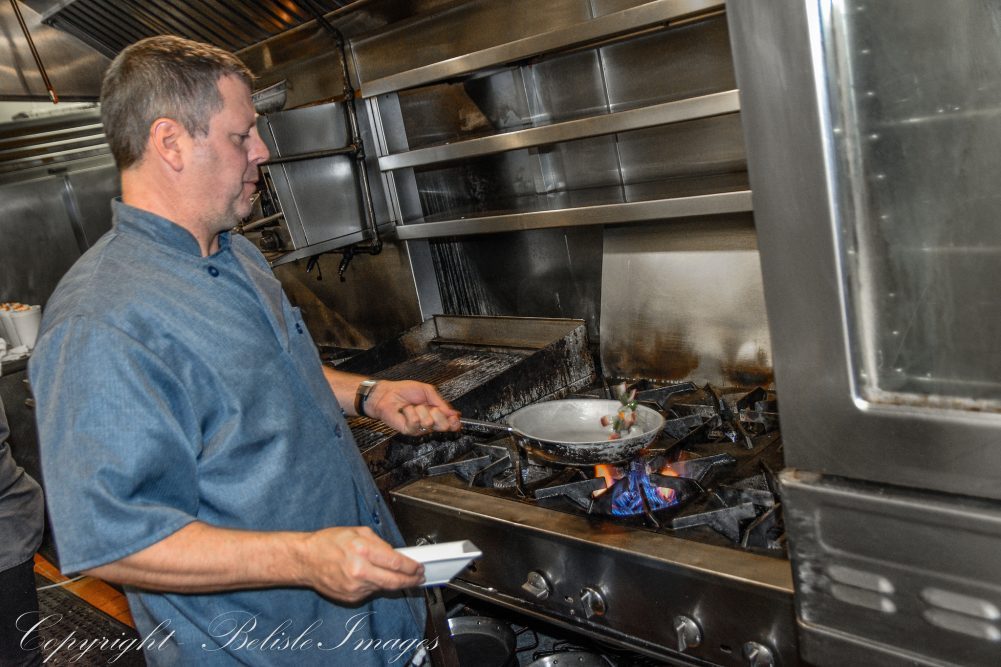
When a chef tells you he “still loves to cook,” you might think he is saying it as part of a nostalgic account of a career gone by. Steve Champagne is doing anything but retiring.
What Steve means when he says he still loves to cook is that he no longer mans the stoves or leads a team in one restaurant anymore; he’s just thriving in a completely different way as the executive chef of and a partner in Niche Hospitality Group (owner of eight beloved restaurants including three Bocado Tapas Bars and two Mezcals).
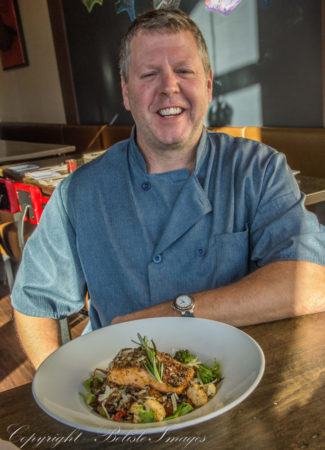
Steve used to be the other kind of chef. He’s been cooking in Worcester for more than two decades – ever since he decided to shift his vocation from engineering to cooking. He worked for years at The Sole Proprietor and 111 Chop House before taking over his first kitchen as executive chef at the dearly departed Struck Café. After The Struck, he came over to Niche and headed up the kitchen at another dearly departed friend, Block 5, before turning his talents to Bocado, Mezcal, and the ever-expanding Niche horizons.
Foodies like me wax rhapsodic at the current state of our culinary affairs in Wormtown, but Bocado and Mezcal remain pretty much singular in expanding beyond Worcester – to Providence, Wellesley, and Leominster. What that means is Steve is constantly on the move, tending to teams, menus, and operations for locations tens of miles apart.
So, yes he still loves to cook – when he has the time: “I’m the manager of the people. I touch that part of the business every single day. I probably don’t cook as much as I would like though I oversee all the food. I research and read. I like to taste what other people are doing. I go out to eat with my wife and will order three dishes we can’t finish, because I need to try as much as I can. My daughter will say to her friend when they join, ‘Just watch. My daddy’s crazy. He’s going to order all this food that we can’t eat.’”
These days time to cook usually comes in waves, creating a wine dinner or a new menu of seasonal dishes at Bocado or the Burger Bar at The Fix. But no new menu has been bigger than the one that launched at Mezcal.
“I was totally embedded in the R&D at Mezcal in Worcester. We are completely rebranding the whole space and gutted the menu,” Steve says. (About 75% of the menu has changed.) “We have been around for a long time. So we are getting new booths, wall coverings, and lighting, and I did a lot of research on Mexican cuisine to make Mezcal more authentic and entree focused. We took a step back and realized it can’t be just tacos anymore. It can’t be only, ‘Do you want chicken, beef, or pork in your quesadilla?’ The burrito isn’t dead, but things got a little tired and had to change. We need to stay current. Our city has become this way. Worcester demands that now.”
Demanding roasted Brussels sprouts with house made chorizo, chili honey, pepitas, cashews, and queso fresco? Um, yes please. “It’s lights out good and a modern dish, “ Steve adds. “That’s what we do now, and it’s fun.”
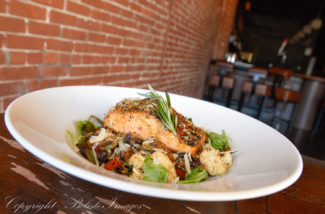
Steve cites Rick Bayless as one inspiration for the Mezcal menu. (Bayless’s Chicago restaurant empire is widely credited for being among the first to elevate traditional Mexican cuisine and introduce its ingredients to diners nationwide.) But he also credits the Mexican-Americans on his own kitchen staff as inspirations for what was possible: “I’d be foolhardy not to listen to these guys. At our commissary, I always pop in and see what Madalena, a Brazilian woman who has been with me since the Struck, is cooking. ‘Whaddya got?’ I’ll ask and she’ll say it is just poor food. Yeah, poor but good. I learned a lot from my team like Miguel who runs Bocado in Worcester. I’ve been to Spain and Mexico but I’m a gringo. I’ve been there and eaten and studied the food but I don’t know it the way they do. So when we created a Yucatan Half Chicken and one of the cooks said it tasted like the chicken his mother makes on Christmas Eve? That’s a super compliment to me. That is exactly what I am looking for.”
But fig and lemon salsa? Boldly flavored purees? Will loyal Mezcal customers feel lost?
“Listen, we have to stay fresh and do new things,” Steve adds. “We are anticipating. You can’t just sit on your laurels. You have to stay current with your menu and your physical buildings, your beverages, your staff… But you still have to have balance what people come there for. I remember at Block 5 when we changed the mushroom and goat cheese spring rolls how disappointed people were. You can’t get completely away from what you are just because you want to do something else. So there will still be the same fresh guacamole at Mezcal. Sautéed shrimp with garlic, parsley and olive oil [Gambas Al Ajillo] is a traditional dish that will always be on the Bocado menu. I imagine if we took the fried goat cheese off the menu at Bocado? We might as well just lock the door.”
That said Steve is always willing to try something unexpected and play with color palates, bold flavors, and different textures to create unexpected dishes – some mash ups, some just because he can. Tuna poke, a quintessential Hawaiian dish, turns up at Bocado Worcester because Steve was just there this summer, but Moroccan lamb is there as a reflection of the country’s influence on Spain. In the Wellesley location, New England brown bread is grilled in a wood-burning oven and topped with seared foie gras, mustard reduction, and cranberries – a cool fall dish that takes a little from Spanish and New England traditions. For a recent Mass Foodies event, Steve took creamy rich burrata and served it for dessert with an olive oil cake – something different for an audience that craves it.
Yet when I asked Steve to cook something for this profile that represented him on a plate, he turned to nothing from his Niche repertoire but to something he would cook for himself and his wife. “A little throw together lunch,” he says.
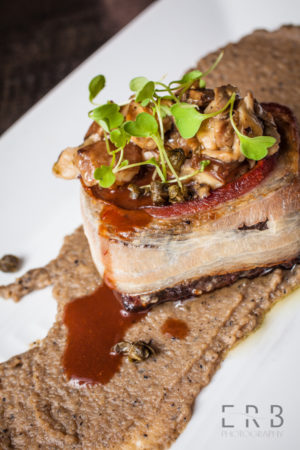
“At home, I like to cook and I try and cook healthier,” he says and laughs. “A little healthier versions of things we like to eat and still enjoy it. At the restaurants, I am always picking and eating from a sheet pan of sausage, imported cheeses, bacon… you never pick at lettuce.”
Yet the dish he makes – a seared salmon with aleppo pepper and smoked paprika served on a bed of mesclun greens warmed by a sauté of black beans, cauliflower, peppers, onions, tomatoes, and rosemary topped with a sauce of white wine and grain mustard and a bit of Manchego cheese – is easily good enough to end up on a menu. (Note to self: Steve Champagne’s “little throw together” lunches are not the same as mine.) The spicy earthiness of the aleppo and the brightness of the vegetables wilting the greens were both comforting and unexpected. In fact, if a dish like this works at home and Steve likes the way the flavors come together he may translate it to a restaurant.
Which is probably the biggest opportunity the current Worcester scene offers. When Bocado opened ten years ago, few understood tapas. Few understood sharing. Few explored beyond meat and potatoes. Now Steve can push the boundaries – both on the plate and behind the scenes.
“I hate waste,” he says. “I am always the guy who looks on the shelf and says okay I have a case of bulgur wheat that’s still good. I want to use that. We have a purchaser for our company and I want that person to tap into the movement for ugly fruit and vegetables. I want to do that. It is extraordinary how much food gets wasted from supermarkets. It’s awful. I don’t waste anything at home. I want less at the restaurants. So how can we change as a group?”
Judging from our conversation, Steve will probably figure that out at the stove, on a Sunday at Bocado when it’s quiet and no one is around.
“When I come home on those days my wife will ask how it went and I’ll say, ‘Really good. I still love to cook.’ And she’ll see me smile and say, ‘You say that every time.’”
